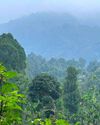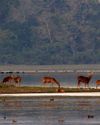
Instagram has exploded with travel itineraries from Rampur to Reykjavik. There are travelling themes, types of travellers and topic-specific travel, which brings us to the crux of this story, Kaziranga National Park. It is an unapologetically naturebased place, full of various species of wildlife. You don’t have to be a die-hard wildlife lover to visit Kaziranga.
Let’s get to know this park a bit better. Situated in the state of Assam, the park is located at the edge of the Eastern Himalayan biodiversity hotspots – Golaghat and Nagaon districts. The Park was formed in 1908 on the recommendation of Mary Curzon. She was the wife of the Viceroy of India, Lord Curzon of Kedleston and had visited the park to see the Indian one horned rhinoceros. She didn’t get to see a single rhino. She then persuaded her husband to take urgent measures to protect the dwindling species which he did by initiating planning for their protection. After a series of meetings and documentations, the Kaziranga Proposed Reserve Forest was created with an area of 232 kms in 1905.
In 1985, the park was declared a World Heritage Site by UNESCO.
This story is from the {{IssueName}} edition of {{MagazineName}}.
Start your 7-day Magzter GOLD free trial to access thousands of curated premium stories, and 9,000+ magazines and newspapers.
Already a subscriber ? Sign In
This story is from the {{IssueName}} edition of {{MagazineName}}.
Start your 7-day Magzter GOLD free trial to access thousands of curated premium stories, and 9,000+ magazines and newspapers.
Already a subscriber? Sign In

National Parks Of India
India is blessed with a rich tapestry of biodiversity that is both a natural heritage and a national treasure. The concept of national parks in the country traces back to the late 19th century when the importance of conserving wildlife began to take root in the consciousness of the colonial administration. The first national park in India, Hailey National Park (now known as Rajaji National Park), was established in 1936, marking a historic commitment to wildlife conservation. The post-independence era saw an exponential increase in protected areas, primarily driven by a need to conserve India’s unique flora and fauna threatened by rampant industrialization and urbanization.

10 Fascinating Wildlife Sanctuaries
TO EXPLORE THE WILD SIDE OF INDIA

Conversation with the "BOOK MARKETING GIRL"
In an age where digital advancements and artificial intelligence often overshadow traditional practices, two visionaries have chosen a different path.

FARM AAVJOSAA - HER STORY
“Riddhi was a whirlwind of energy, unable to endure even a minute apart from her twin, Siddhi.

FOOD MEETS FANTASY IN CROATIA
As the sun dipped below the horizon, casting a warm golden glow over the rolling hills of Croatia, Foodpreneur Debaditya Chaudhury found himself on a gastronomic adventure that promised to tantalize his taste buds and inspire his culinary creativity.

THE UNTAMED BEAUTY OF SATPURA TIGER RESERVE
In Conversation with L. Krishna Moorthy, The Field Director of Satpura Tiger Reserve

SUNDARBANS THROUGH THE DECADES
As Witnessed By Anil Mistry, The Swamp Tiger Rescuer

LOOK EAST - WILDLIFE AND TOURISM IN THE NORTHEAST OF INDIA.
The North East of India is an ecological and biodiversity hotspot. Diverse habitats and ecosystems - each with its own species of birds, animals and plants – make this region home to an abundance of flora and fauna.

KAZIRANGA NATIONAL PARK AND TIGER RESERVE
There is a mad frenzy for travelling in recent times. Everywhere you look, read, or hear, people travel worldwide, domestic, offbeat travel has become a trend.

CORBETT NATIONAL PARK: A Legacy of Conservation and Biodiversity
From the moment I set foot in the enchanting and tranquil realm of Corbett National Park, a deep connection was forged in my heart.